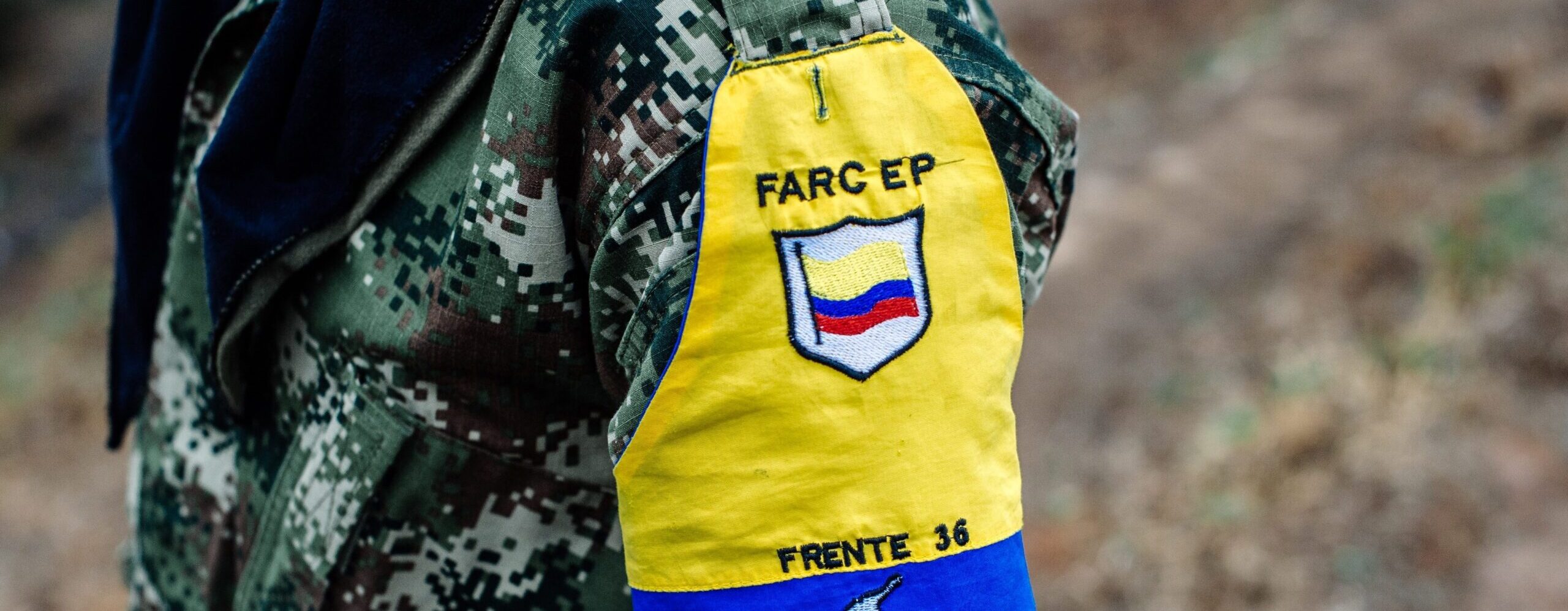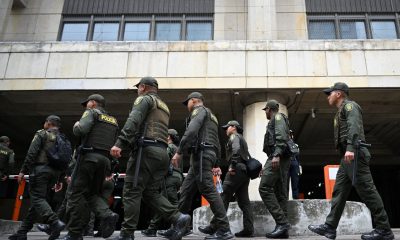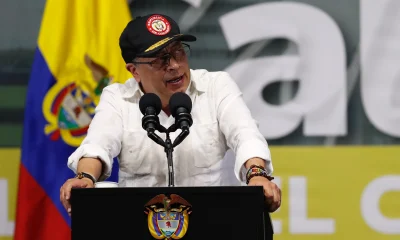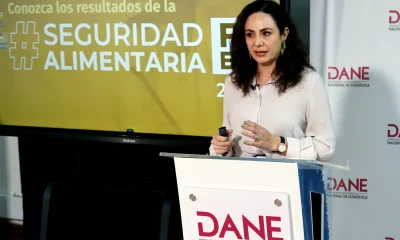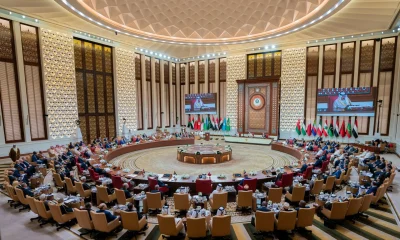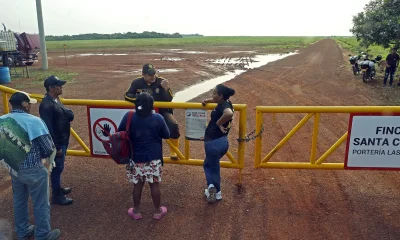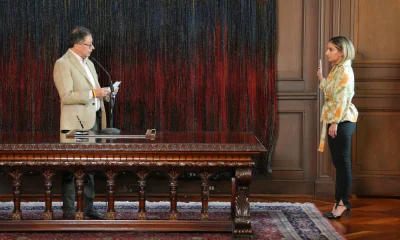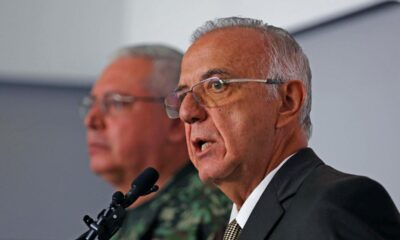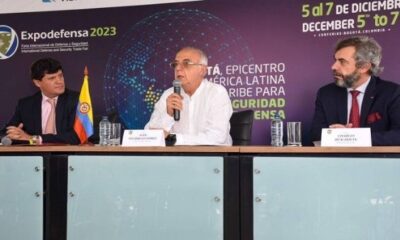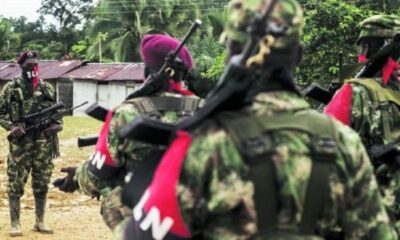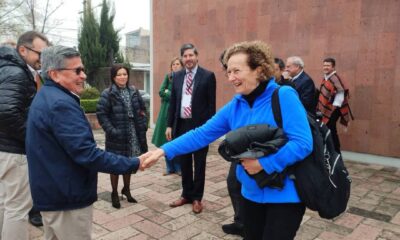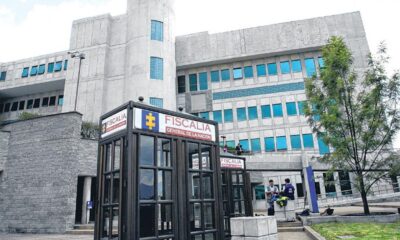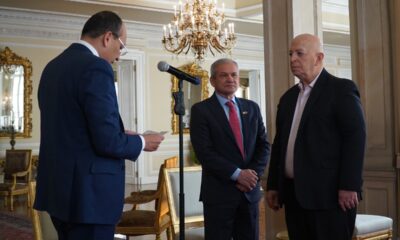International
Colombia’s crusade to repatriate its archeological heritage
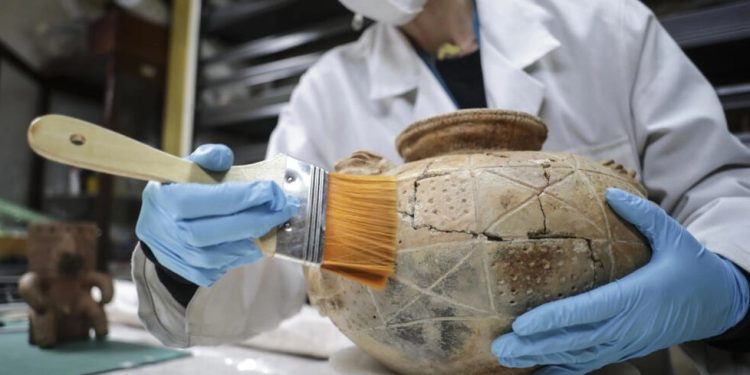
November 5 |
Wearing latex gloves and a white coat, restorer Carla Medina holds part of Colombia’s history in her hands. A growing number of pre-Columbian pieces are returning from abroad in an unorthodox way: President Gustavo Petro himself is bringing them back.
“It’s a great responsibility and a great privilege,” he tells AFP in his laboratory at the Colombian Institute of Anthropology and History (ICANH).
Medina, 41, analyzes a clay vessel repatriated from Italy, which had to be reconstructed from fragments. She is grateful “to have the opportunity to have access to an object that has so many years of history”.
At least 560 pre-Columbian pieces were returned from other countries aboard the presidential plane of leftist Gustavo Petro, in some of the more than 30 trips abroad that he has completed in just over a year in office. International tours criticized by the opposition as dispensable and costly.
Most of the pieces returned from the United States, United Kingdom, Belgium, Spain, Germany, Mexico, among other countries, in a coordinated work between the Foreign Ministry and ICANH.
One of the most recent returns was in October and took place on the diplomatic vessel Gloria, where 12 archeological pieces traveled from Costa Rica to Cartagena.
The recovery is part of a strategy of “efficient use of resources”, said at the time the former vice-minister of Multilateral Affairs, Laura Gil, and is advancing at an accelerated pace compared to the previous government, in which only 18 pieces were repatriated in four years.
For Catalina Ceballos, director of cultural affairs at the Foreign Ministry, it is a way to “start talking about decolonization from another perspective.”
Most of the pieces returned to Colombia were taken out of the country when there was no legal clarity in the world on the traffic of archaeological goods.
Only since 1997 has Colombian law recognized the State as the legitimate owner of national archaeological heritage.
However, the fight against illegal trafficking of these pieces has not been a priority in a country bled by half a century of armed conflict between authorities, guerrillas, paramilitaries and criminal gangs. While the budget suggested by the Presidency for ICANH in 2024 is equivalent to some 2.3 million dollars, that proposed for the defense area and the Police is almost 600 times greater.
Juan Pablo Ospina, coordinator of the anthropology group at ICANH, nevertheless emphasizes that in the current government repatriations have been “successful” because the presidential plane has been “fully available” to bring pieces “properly packed and safeguarded on those trips”.
Recent returns have been made mostly by private collectors on a voluntary basis and require diplomatic work in each country of origin. ICANH is then in charge of the registration, cataloguing, transfer, reception and, in some cases, intervention of the pieces.
As most of the repatriated works are ceramic, the restoration processes are simpler. “Even though they are very old, they can be very well preserved with the passage of time,” says Medina.
The most vulnerable materials are those “of an organic nature,” such as textiles, paper or wood.
The composition of the materials also offers details about how Colombia’s early societies functioned in relation to their territory, says Medina.
For the most part, the Colombian territory was made up of pre-Columbian societies distributed in small chiefdoms.
Ospina assures that what today corresponds to Panama, Venezuela, Colombia and part of northern Ecuador is known as the “intermediate zone” in Latin American archeology, “because what happened there is completely different from what happened in Mesoamerica or in the central Andes,” where great empires were formed.
That is why in Colombia, unlike in Mexico or Peru, it is not common to find palaces, pyramids or large goldsmith traces, with one great exception: the treasure of the Quimbayas. A collection of gold found at the end of the 19th century in a small village in the department of Quindío (west), donated at that time to the Queen of Spain by the Colombian president Carlos Holguín and which today is in the Museum of America in Madrid.
Most of Colombia’s archaeological treasures are ceramic pieces from different periods and cultures, some 6,000 and 7,000 years old, found in the Caribbean, Ospina explains.
“They are very early evidence of ceramics,” he adds.
In other Colombian regions the use of ceramics dates back to approximately 1,000 BC, present mainly in religious and funerary rites.
International
U.S. Senate Rejects Budget, Bringing Government Closer to Shutdown Amid DHS Dispute

The U.S. Senate voted on Thursday against a budget proposal in a move aimed at pressuring changes at the Department of Homeland Security (DHS), following the killing of two civilians during a deployment of immigration agents in Minneapolis.
All Senate Democrats and seven Republican lawmakers voted against the bill, which requires 60 votes to advance, pushing the country closer to a partial government shutdown that would cut funding for several agencies, including the Pentagon and the Department of Health.
The rejection came as Senate leaders and the White House continue negotiations on a separate funding package for DHS that would allow reforms to the agency. Proposed measures include banning Immigration and Customs Enforcement (ICE) agents from wearing face coverings and requiring them to use body-worn cameras during operations.
The vote took place just hours after President Donald Trump said he was “close” to reaching an agreement with Democrats and did not believe the federal government would face another shutdown, following last year’s record stoppage.
“I don’t think the Democrats want a shutdown either, so we’ll work in a bipartisan way to avoid it. Hopefully, there will be no government shutdown. We’re working on that right now,” Trump said during a Cabinet meeting at the White House.
International
Trump Says Putin Agreed to One-Week Halt in Attacks on Ukraine Amid Extreme Cold

U.S. President Donald Trump said on Thursday that he secured a commitment from Russian President Vladimir Putinto halt attacks against Ukraine for one week, citing extreme weather conditions affecting the region.
“Because of the extreme cold (…) I personally asked Putin not to attack Kyiv or other cities and towns for a week. And he agreed. He was very pleasant,” Trump said during a Cabinet meeting broadcast by the White House.
Trump acknowledged that several advisers had questioned the decision to make the call.
“A lot of people told me not to waste the call because they wouldn’t agree. And he accepted. And we’re very happy they did, because they don’t need missiles hitting their towns and cities,” the president said.
According to Trump, Ukrainian authorities reacted with surprise to the announcement but welcomed the possibility of a temporary ceasefire.
“It’s extraordinarily cold, record cold (…) They say they’ve never experienced cold like this,” he added.
Ukrainian President Volodymyr Zelensky later commented on the announcement, expressing hope that the agreement would be honored.
International
Storm Kristin Kills Five in Portugal, Leaves Nearly 500,000 Without Power

Storm Kristin, which battered Portugal with heavy rain and strong winds early Wednesday, has left at least five people dead, while nearly half a million residents remained without electricity as of Thursday, according to updated figures from authorities.
The revised death toll was confirmed to AFP by a spokesperson for the National Emergency and Civil Protection Authority (ANPEC). On Wednesday, the agency had reported four fatalities.
Meanwhile, E-Redes, the country’s electricity distribution network operator, said that around 450,000 customers were still without power, particularly in central Portugal.
Emergency services responded to approximately 1,500 incidents between midnight and 8:00 a.m. local time on Wednesday, as the storm caused widespread disruptions.
The Portuguese government described Kristin as an “extreme weather event” that inflicted significant damage across several regions of the country. At the height of the storm, as many as 850,000 households and institutions lost electricity during the early hours of Wednesday.
Several municipalities ordered the closure of schools, many of which remained shut on Thursday due to ongoing adverse conditions.
Ricardo Costa, regional deputy commander of the Leiria Fire Brigade, said residents continue to seek assistance as rainfall persists.
“Even though the rain is not extremely intense, it is causing extensive damage to homes,” he noted.
In Figueira da Foz, a coastal city in central Portugal, strong winds toppled a giant Ferris wheel, underscoring the severity of the storm.
-

 Central America5 days ago
Central America5 days agoGuatemala seizes over a ton of cocaine hidden in flour at Pacific port
-

 Central America4 days ago
Central America4 days agoGuatemala Police Arrest Prison Guard Caught in the Act of Extortion
-

 Central America4 days ago
Central America4 days agoHonduras swears in conservative president Asfura after disputed election
-

 International5 days ago
International5 days agoHistoric snowstorm paralyzes Toronto after 60 centimeters of snow
-

 Central America4 days ago
Central America4 days agoBukele leads public trust rankings as UCA survey highlights gains in security
-

 International3 days ago
International3 days agoFootball Fan Killed in Clashes After Colombian League Match
-

 International5 days ago
International5 days agoSpain’s irregular migrant population rises to 840,000, study finds
-

 Central America3 days ago
Central America3 days agoGuatemala President Says Starlink Terminal Found Inside Prison
-

 International4 days ago
International4 days agoDoomsday clock moves to 85 seconds before midnight amid rising global risks
-

 International4 days ago
International4 days agoWinter Storm Fern Leaves 30 Dead and Over One Million Without Power Across the U.S.
-

 International2 days ago
International2 days agoU.S. Senate Rejects Budget, Bringing Government Closer to Shutdown Amid DHS Dispute
-

 Sin categoría4 days ago
Sin categoría4 days agoEight Killed in Series of Armed Attacks in Ecuador’s Manabí Province
-

 International4 days ago
International4 days agoSpain approves plan to regularize up to 500,000 migrants in Historic Shift
-

 International5 days ago
International5 days agoRights group says nearly 6,000 killed in Iran protest crackdown
-

 International3 days ago
International3 days agoRubio Says U.S. Could Participate in Follow-Up Russia-Ukraine Talks
-

 International3 days ago
International3 days agoMissing Spanish Sailor Rescued After 11 Days Adrift in Mediterranean
-

 Sin categoría4 days ago
Sin categoría4 days agoEl Salvador Launches Fourth Year of Ocean Mission to Protect Marine Ecosystems
-

 Central America15 hours ago
Central America15 hours agoPanama Supreme Court Strikes Down Panama Ports Concession as Unconstitutional
-

 International5 days ago
International5 days agoVenezuela frees at least 80 political prisoners, NGO says
-

 International5 days ago
International5 days agoEU launches new probe into X over AI-generated fake nude images
-

 International2 days ago
International2 days agoStorm Kristin Kills Five in Portugal, Leaves Nearly 500,000 Without Power
-

 Central America15 hours ago
Central America15 hours agoU.S. and Guatemala Sign Trade Deal Granting Zero Tariffs to Most Exports
-

 International2 days ago
International2 days agoTrump Says Putin Agreed to One-Week Halt in Attacks on Ukraine Amid Extreme Cold
-

 International2 days ago
International2 days agoMan Arrested After Vehicle Crashes Into Jewish Institution in Brooklyn
-

 International5 days ago
International5 days agoSevere winter storm grips U.S., leaves multiple dead as extreme cold persists
-

 International5 days ago
International5 days agoFrance debates ban on social media for children under 15







































